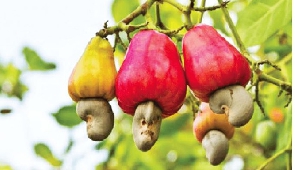The Director of Crop Services at the Ministry of Food and Agriculture (MoFA), Mr Seth Osei Akoto, has urged farmers in the northern part of the country especially, the Upper East and Upper West regions to embrace the cultivation of cashew.
The move, he said would help reduce desertification of the Savannah Regions and also mitigate the impact of climate change on the ecosystem.
“Per the climate change effect on farming and the environment at large, cashew has the future when it comes to addressing the menace. Cashew is resilient, and a very hard tree making climate change effect on it minimal,” he said.
He added that the economic benefits of Cashew were enormous, saying “cashew is the leading non-traditional export commodities generating substantial income for the country and value chain actors as well.”
Mr Akoto was speaking in an interview with the Ghanaian Times on the sidelines of a field visit to the Wenchi Agricultural Station in the Bono Region.
The trip was organised by Competitive Cashew Initiative (GIZ/Com.CashewAlliance) with support from MofA and the Cocoa Research Institute Ghana (CRIG).
It was to build the capacity of about 22 trainees under the second session of the 10th Edition of the Master Training programme for cashew value chain promotion.
The participants were taken through all aspects of cashew production, including grafting and how to identify pests and insects control.
It was aimed to increase the theoretical knowledge and practical skills of African cashew along the value chain among others.
Touching on the delay of the operationalisation of the Tree Crop Development Authority (TCDA), Mr Akoto said although everything had been put in place for work to begin, certain challenges had accounted for the delay.
He, however, assured that the TCDA would soon take off to regulate the sector to enable farmers to benefits from their toils.
The TCDA was inaugurated by President Nana Addo Dankwa Akufo-Addo in September last year as the regulatory body for six crops: cashew, shea, mango, coconut, rubber and oil palm.
Business News of Sunday, 9 May 2021
Source: goldstreetbusiness.com
Farmers urged to embrace cashew cultivation
Entertainment












